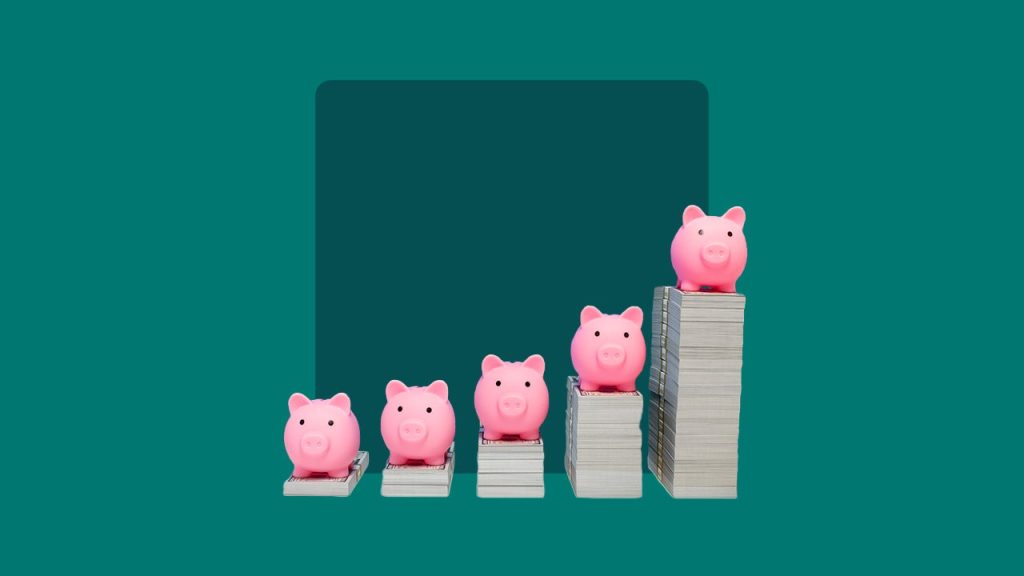Inflation has been stealing from your paycheck, and all signs indicate that’s not going to change anytime soon.
Even if your salary hasn’t changed, the cost of groceries, gas and essential services have risen, leaving many Americans feeling like they’re working harder for less purchasing power. A 2025 Bankrate analysis of data from the Bureau of Labor Statistics showed that consumer prices are 23.6 percent higher than they were in February 2020.
Waiting for a raise or promotion or starting a side hustle might seem like the only solution, but here’s a powerful alternative: You can give yourself a raise now.
This isn’t about asking your boss for more money (though you absolutely should when the time is right). Instead, you can use these four simple, strategic moves to free up hundreds — even thousands — of dollars each year.
1. Stop giving passive income to credit card companies
According to the Federal Reserve Bank of New York, Americans now hold $1.18 trillion in credit card debt, which currently averages above 20 percent in interest. That debt can feel like a permanent tax on your income.
If you’re carrying a credit card balance from month to month, your payments feed the credit card company’s bottom line while taking a bite out of your income. Paying off even one card can “give you a raise” by eliminating a monthly obligation.
Tales from a money coach
One exercise I do with many of my clients is to calculate the total amount of interest they’ve paid on credit card debt. This week, a client realized he was paying over $500 a month in interest alone.
We reprioritized his money goals and focused on paying down the card with the smallest balance first. When it was paid off, he redirected that money toward the debt with the next-smallest balance. Paying off small balances can yield an easy win that helps build momentum.
Known as the debt snowball method, I recommend this approach over starting with the debt with the highest interest rate (also called the debt avalanche method). Even though prioritizing debts with the highest interest rates can result in greater savings over time, eliminating a bill altogether feels like getting a raise faster.
2. Ditch the car debt that’s draining your paycheck
Experian’s quarterly report found that the average monthly car payment for new cars is $745, and $521 for used in the first quarter of 2025. That’s more than $8,900 (or $6,200) spent every year on an asset that’s losing value.
Imagine being able to put those hundreds of dollars toward other necessities or fun things, like vacations. Paying off your car loan early can put you in better control of your cash flow and help you build savings that earn money instead of losing value.
If you’re close to paying off your vehicle, challenge yourself to make extra car payments for the next six months. Even if you go back to making minimum payments after that, you’ve pushed yourself much closer to the finish line. Once your auto debt is paid in full, you’ll have earned a raise worth hundreds of dollars each month.
Tales from a money coach
A follower recently shared that she paid off her car and began putting that payment toward her mortgage instead. As a result, she’s on track to pay off her home a few years early and possibly retire early, too.
3. Make your savings work harder than you do
Perhaps the easiest and fastest way to give yourself a raise is to put your savings to work. The money sitting in your regular savings account that earns 0.01 percent interest is what I call “lazy money.” Sure, it’s there in case you need it, but what if it could be available when you need it and make money for you in the meantime?
Instead, your money could be earning much more in a high-yield savings account or money market account with rates around 4 percent (as of June 2025).
For example, if you have $10,000 in a high-yield account earning 4.5 percent, your balance will grow by $450 a year with zero effort. (Compare that to the whopping $1 you might earn in your regular savings account.)
That could equate to a month of groceries, a weekend getaway or two tickets to a K-pop concert — benefits you’d be leaving on the table by keeping your money in a low-interest account.
Even if you start with just $1,000 in savings, a $45 yield is still a nice bonus for no work in return. Plus, it fosters the habit of saving more and can reduce your reliance on debt later on.
If you have an emergency fund (which I like to call a Keep Calm fund), consider moving it to a high-yield savings account, a short-term CD or a money market to start earning passive income.
4. Quit the unpaid overtime that’s draining your energy
I’ve left the most challenging strategy for last, and it’s a tactic that my clients have the hardest time implementing, especially those who were conditioned to “always be productive.”
You’re not being paid to over-deliver on tasks that no one asked you to do. Many high-achieving professionals fall into the trap of “proving” their worth by taking on invisible labor at work, including:
- Proofreading emails your team will gloss over
- Staying up late to perfect presentations
- Volunteering for every extra project
- Over-preparing for meetings
But here’s the truth I learned the hard way: Working long hours on tasks that won’t earn you a promotion or pay raise is like working overtime for free. That time could be used to learn a higher-paying skill, pick up a side hustle or simply rest — rest that boosts your performance, strengthens your relationships and improves your financial decision-making in the long run.
Tales from a money coach
This week, I resolved to only check my business social media accounts once a day. I used to view constant social media engagement as just another part of my job as a content creator and author. But instead of scrolling, I went to bed hours earlier and was up for 6 a.m. yoga every day this week, something I never thought I’d have the energy or motivation to do.
With my newfound time and energy, I pitched a new deal today that earned me $1,500 in just an hour. I cringe at how much time I’ve wasted by perfecting posts that strangers simply scroll past, when I could use that time to serve the clients I already have.
Audit your upcoming week and cut one low-value task that no one would notice if you stopped doing. Reclaim that time for your physical or financial wellness, or to focus on the tasks that will make you money.
Final thoughts: Stop waiting for someone else to give you a raise
Giving yourself a raise can be accomplished by working less, if you choose to be more strategic with your paychecks.
Wiping out your credit card debt, eliminating your car payments and moving your savings to accounts that work for you may not increase your top line, but will certainly increase your net income. And be sure to value your time like the non-renewable resource it is.
You don’t have to let inflation eat away at your paycheck or grow old waiting for that promotion you were promised. Instead, you can give yourself a raise today, with the dollars and time you already have.
Read the full article here









